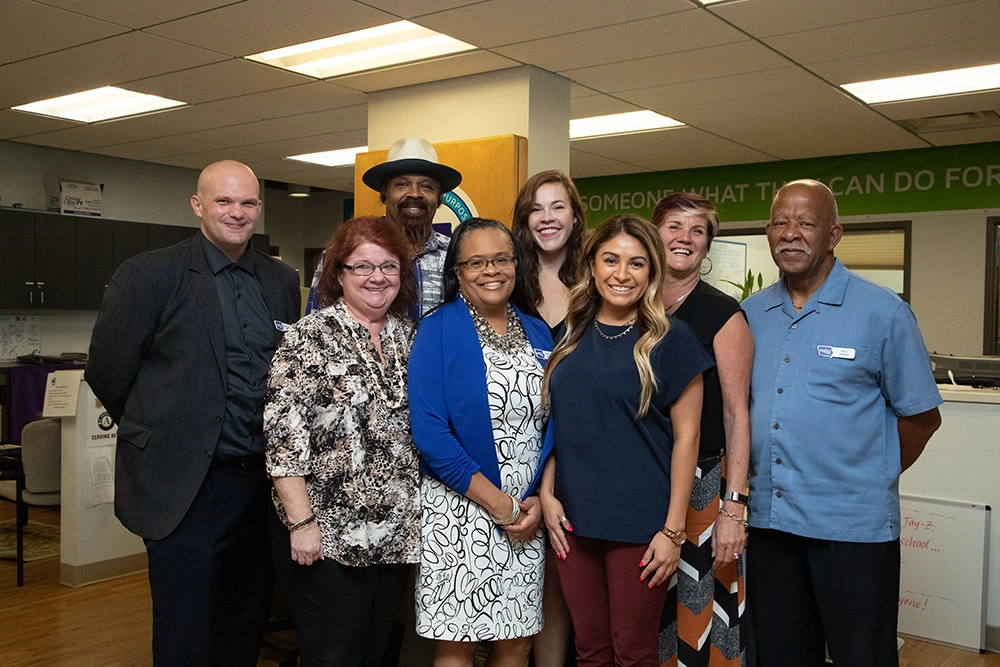Project IOWA Receives $40,000 Opus Foundation® Grant for Data-Driven Expansion
The Foundation grant will be used for the implementation of a data-tracking system to allow the nonprofit to help create pathways out of poverty for the working poor.

One of the Opus Foundation's key areas of focus is supporting workforce development initiatives that position and prepare underemployed and unemployed people for career advancement and greater self-sufficiency. Recently the Foundation awarded a sizeable $40,000 Impact Fund grant to Project IOWA, a nonprofit in Des Moines that creates pathways out of poverty for the working poor.
Transforming Lives & Bridging the Employment Gap
Project IOWA transforms lives and benefits communities by bridging the gap between people seeking livable wage careers and employers seeking workers. They offer a free, three-month career training program that includes 150 classroom contact hours and wrap-around services that build constructive relationships and supportive work networks, ultimately helping participants obtain viable employment and local businesses find skilled labor.
“We train the underpaid and unemployed," said Julie Fugenschuh, Executive Director of Project IOWA. “Iowa is a low wage state with a minimum wage of $7.25 per hour, which equates to about $14,000 per year. We dedicate most of our resources to helping individuals who are working three jobs to make ends meet find and sustain full-time jobs that pay $13 to $16 per hour with paid time off, benefit packages and growth opportunities."
Participants first attend Project IOWA's core curriculum, Path to Purpose (formerly V.I.P.). This four-week required program helps them understand one of the most important foundations required to obtain and sustain a meaningful career – their mindset and attitude toward themselves and others. They then take courses on digital skills for marketing themselves, personal development, wellness and stress reduction, quality/problem solving and troubleshooting, job seeking tools and interviewing skills. They graduate from the program with a personal portfolio that includes their resume, cover letter, typing certificate, personal mission statement and wellness tools. Then the Project IOWA team assists with job placement services, which involves working with local business partners in need of skilled workers.
“We carefully vet businesses to ensure they pay within the range we want, treat their employees well, offer benefits and growth opportunities, and are supportive of our program and participants," said Fugenschuh.
Implementing Data-Driven Decision Making
The Impact Fund grant will support the implementation of customer relationship management (CRM) system, which will replace an antiquated system currently in place. The grant will help fund the software, a consultant and training for the Project IOWA staff. The CRM will allow Project IOWA to gather and track data for better-informed decision making. Insights based on real-time data will drive improvements to the program, such as ensuring the skills training continues to meet employer needs, better understanding the needs of the marketplace, and tracking graduate progress over time in their careers.
I'm on the board at Project IOWA and a member of the Business Partner Committee, which strengthens and expands relationships with businesses who hire Project IOWA graduates and support the organization. I got involved because I saw Project Iowa making a real difference in people's lives.
The work Project IOWA is doing is important for several reasons:
There's a shortage of skilled labor in Iowa, and Project IOWA is providing training and qualified candidates for local businesses.
At the same time, we are helping hardworking people who want to improve their lives. Staying in low-paying, dead-end jobs creates a perpetual cycle of poverty. Teaching self-sufficiency improves our community and makes for a better world.
This program isn't about handouts – it's about offering people a hand-up so they can help themselves.
Building Success Collaboratively
Since its inception in 2011, Project IOWA has trained 725 people in its core Path to Purpose curriculum and provided workforce competency training to 436 people. The organization has maintained a training completion rate of 88% and a career placement rate of 82%. Project IOWA graduates are making on average $13.24 an hour, compared to $9.21 before they started the program.
“Opus was one of our founding sponsors and has been a partner since the beginning," said Fugenschuh. “In addition to generous grants, they have supported us in so many other ways. For instance, as a member of the board, Jeff has been instrumental in helping us design and create sustainable approaches to achieve our goals, and Kristin Ridley, Executive Director of the Opus Foundation, has made important connections for us with other organizations and individuals who share our passion.
“Opus helped us shape our programming," she said. “Now they are helping us implement better systems to understand what that programming is doing, so we can perfect our programs and make the most impact."
The Opus Foundation, the corporate foundation of Opus, is building community for a better tomorrow by supporting projects and programs that make our communities better places to live, work and raise families. The Foundation is committed to improving conditions that disproportionately affect historically underinvested individuals and communities by focusing on early childhood education, youth development, workforce development and community revitalization. Read more about the Foundation's work. The Opus Foundation is a separate entity from The Opus Group and is led by its own Board of Directors.
Article Type: Blog Post
Topics: Des Moines | Opus Foundation | Giving


